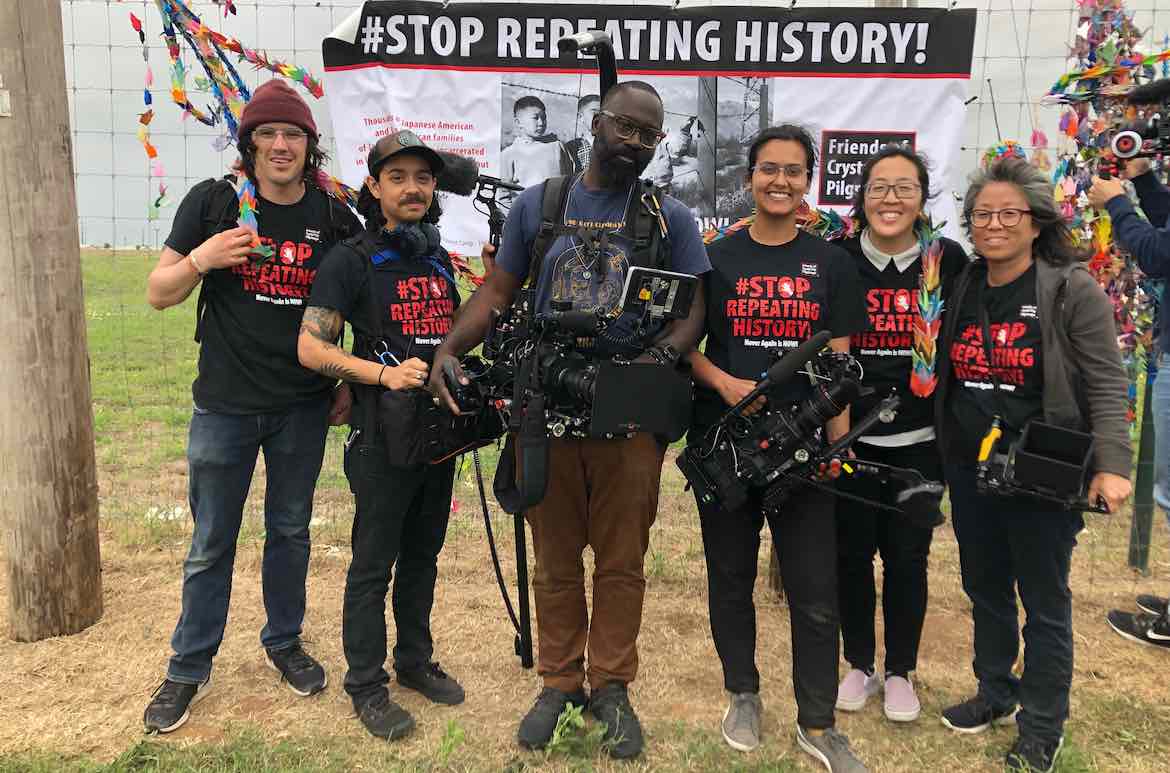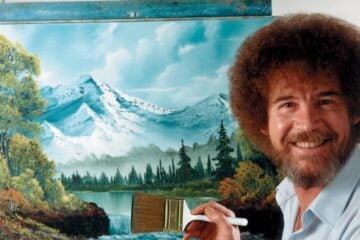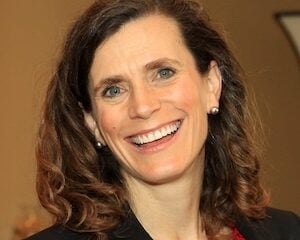To truly reflect diversity, PBS must end its overreliance on Ken Burns as ‘America’s Storyteller’

Courtesy of "Asian Americans"
The production crew for "Asian Americans" at a 2019 rally outside the detention center in Crystal City, Texas, where Americans of Japanese descent were imprisoned during World War II.
This essay is part of Creative Futures, a series of provocations by artists, documentary filmmakers and journalists describing concrete, actionable plans that would help transform society toward a more just, equitable and democratic future.
The Ford Foundation’s Creativity and Free Expressions program initiated the project by inviting 44 thinkers from the arts, documentary filmmaking and journalism to contribute essays responding to demands for change that have risen from the inequities laid bare by the COVID-19 pandemic, police killings of people of color and protests that spread globally in response. The prompt to essayists requested “provocations” drawn from personal experience to envision how their sectors can change to advance social and cultural transformation.
Grace Lee’s provocation on the need for “more than one lens” for PBS’ long-form documentary films is republished here in full with permission from the Ford Foundation.
For many, public television is synonymous with Ken Burns. Documentary series like The Civil War, Baseball, Jazz and The Vietnam War have led PBS to market him as “America’s storyteller,” as if there were only room for one. It’s worth remembering how and why PBS came to be, and time to reinvent this system for today’s America.
In 1967, amid widespread civil unrest, CPB was created by an Act of Congress “to expand and develop a diversity of programming dependent on freedom, imagination and initiative on both local and national levels.” PBS was founded in 1969 to interconnect public television stations and distribute programs. Fifty-one years later, as we undergo another societal breakdown and racial reckoning, how much does PBS reflect the audiences it was intended to serve?
I take this question seriously because I largely owe my own documentary career to PBS. In 2020, I was a producer on Asian Americans, a groundbreaking series for which we had five hours to tell 150 years of history spanning from the Chinese who built the railroads to South Asians targeted after 9/11. Compare this to 16 hours of Country Music, which also aired in 2020, or 13 hours of The Roosevelts — both by Ken Burns. His 2021-2024 slate includes six hours on Ernest Hemingway, eight hours on Muhammad Ali, and four hours each for Benjamin Franklin, and the American Buffalo. When bison merit 80% of the airtime afforded to Asian American history, it calls into question not only the leadership of public television but also who gets to tell these stories, and why.
“Ken Burns is a reliable moneymaker for PBS, but that doesn’t mean other filmmakers could not be. Risk aversion is a real concern within a system threatened by defunding every year, but this is the time to be bold.”
The decades-long interdependence of PBS decision-makers, philanthropists, and corporate funders with one white, male filmmaker highlights the racial and cultural inequities perpetuated by this system. The amount of broadcast hours, financial support (from viewers like who?), and marketing muscle devoted to one man’s lens on America has severed PBS from its very roots. Wasn’t the initial goal to break down inequality?
So what do we do about it?
First, ensure that public television board rooms, executives, local stations and filmmakers reflect the diversity of America. Every tentpole series from American Masters to Frontline to Independent Lens has been led by white decision-makers since inception. What would these series look like with BIPOC at the helm?
Fund seasoned BIPOC filmmakers at the same level that PBS has supported Ken Burns for the past 40 years. Burns is a reliable moneymaker for PBS, but that doesn’t mean others could not be. Risk aversion is a real concern within a system threatened by defunding every year, but this is the time to be bold. Sidebar “diversity development” programs are not enough. Ample talent exists to create urgent and necessary programming like Eyes on the Prize or Asian Americans on a yearly basis, not once every generation.
Reassert that PBS is not beholden to one audience for its viewership and revenues. Limiting Black, indigenous, Latinx, and Asian American content to token one-offs and heritage months sustains the myth that our stories are something other than part of the American experience. It’s time for a new canon and new investment in audiences who can be a financial engine for PBS.

Public television leadership must redesign its future together with the storytellers and audiences who will keep it relevant for the next 50 years. If we don’t start in this extraordinary year of reckoning, PBS will fail its founding ideals once again.
Since directing and producing two episodes of Asian Americans, filmmaker Grace Lee produced and directed with Marjan Safinia And She Could Be Next, the 2020 POV documentary miniseries that was predominantly staffed by women of color and BIPOC filmmakers. She also produced and directed the Peabody Award–winning documentary American Revolutionary: The Evolution of Grace Lee Boggs, which debuted on POV in 2014.







Finally! I’ve been a NPR listener for 40 years and noticed how they only interview leftists now.
what’s wrong with leftists?
Your definition of leftists is clearly different from mine. If you define “leftist” as “people who don’t agree with you”, you’re probably correct. If you define it more narrowly, you may find that many of the interviewees are less leftist than you say they are. I’m a leftist, and there have been plenty of people interviewed who I don’t agree with, but I wouldn’t necessarily characterize them as “rightists”, even if their views were politically more to the right than mine. It’s a bit of an artificial set of names; people have views. They don’t generally choose those views in order to conform to any particular view of political right or left.
Not only ETV but NPR and all of the alpha bit lame stream media has gone very, very left. Cannot get an unbiased report out of any news agency or social media that I know of. Pray something changes.
Ken Burns is a liberal pos. His views come out in his productions. And BTW the Central Park Five are as guilty as Booth who shot Lincoln
Every opinion is to be considered and respected. I’m not a journalist but I’m black and I watch PBS. It appears M’s Lee’s desire to have a better seat at the table and a bigger piece of the “minority pie” is valid but also needs to be pragmatic. This article does highlight the fact that PBS is a business entity supported by (advertising, donations, philanthropy, viewership and government. It appears she needs to advocate for herself like everyone else.
Uhm, I’m assuming the comments here are unmoderated or moderated very lightly. I see evidence of what I suspect is trolling and bot-like posts. Current’s readers are not served in any way by this. Do you have to be a subscriber in order to comment? If so, I would suspect some astroturf campaigners and sh*t-stirrers have ponied up subscription $ just for the purpose of trolling like this. I’m not saying that opinions expressed in comments need to adhere to some sort of homogeneity, of course. But there should be more signal than noise, don’t you think?
Quick fix. People who leave comments shouldn’t be given the advantage/cloak of anonymity. That would elevate the discourse considerably.
This opinion is solely mine and does not reflect any position held by any of my employers past or present
Sincerely,
Laskowski
Hi Mark, these comments are moderated. I didn’t see any that I would call “bot-like,” though I did remove two comments just now that I agree had no value. We allow nonsubscribers to comment.
Hey, Mike, thanks for taking the time out to respond. Moderation must be such a tricky task. You want to have a strong signal to noise ratio (or at least I would), but you also want to uphold freedom of expression. Maybe I used the wrong word when I said “bot-like.” I think what I meant was that I suspect some of these comments come from people who don’t have a heck of a lot invested in the subject material at hand in any meaningful way (as practitioners or as consumers of public media) and are simply using this forum as a springboard for their own predictable and one-dimensional rants and potshots. More like trolls than bots, maybe. But it’s a hard line to walk. Hope you and the current crew keep up the good work. And I hope you and yours are well. Cheers.
60 Minutes had a good piece on Ken Burns last night. It became obvious that the article above is a point of view. It’s an assessment, not an assertion. The 60 minutes piece brought much to light regarding financing of the Burns specials, none of which in any way limits other producers. Wynton Marsalis debunked some of that as well. It’s a counterpoint to the Current piece, and worth watching.
Maybe Henry Louis Gates is not black enough for these critics? He gets almost as much time on PBS. I am a liberal, white, and older. Ken Burns redefined the documentary and Henry Louis Gates built on what Ken Burns did and added to what Ken Burns has done. If the “BIPOC” work these critics are talking about is like the disjoint stuff I see on POV, I don’t see that they are going to get very far replacing Ken Burns and Henry Louis Gates.
Does anyone else but myself find it incredibly ironic (and dare I say very satisfying) that leftist / neo-liberal Ken Burns is on the verge of becoming a victim of the ill-named (because it’s anything but) “woke” mob he helped create and supports?
If far-left PBS wanted to be truly diverse, they would allow the voices of film makers who truly love our country (which is different than loving our corrupted government) and the complex – and, yes, at time contradictory – men and women who fought and gave their lives to create the nation we who are privileged beyond measure get to call HOME.